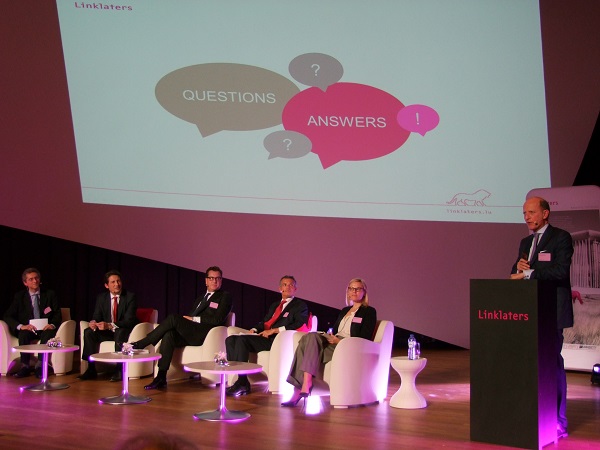
On Thursday evening, Linklaters held their 6th annual Magenta Horizons seminar at the Philharmonie in Luxembourg-Kirchberg attended by around 200 industry professionals to hear their story "Out of Africa".
Managing Partner at Linklates Luxembourg, Freddy Brausch, explained that the Magenta Horizons events look into the future and helps differentiate the firm from the competition. Previous topics of the Magenta Horizons series had included BRICs, the Middle East, China, FinTech and Financial Regulation; this evening's event leveraged the expertise of Linklaters' extended Africa network to explore the remarkable growth potential and breath of investment opportunities opening up in Africa which is witnessing a rapidly changing economic landscape.
He presented a quick over the past 12 months where Luxembourg held the Presidency of the European Council. The financial sector saw a continuation of the evolution of the financial sector with Greece receiving additional financial aid. Private Equity houses are moving to Luxembourg and Real Estate companies are well established here now. Impact financing is offering promising opportunities going forward. Aside from the financial sector, their community investment touches on various charities including Médicines du Monde in Esch, and they have signed the Diversity Charter.
Gideon Moore, Firmwide Managing Partner at Linklaters, stated it is important that the firm continues to progress, helping its staff fulfil their potential. From his recent meeting of minds at Davos in Switzerland, he said he met people from all walks of life, with innovation, challenge, change and disruption being forefront.
The rate of change is picking up and is becoming more unpredictable; this s being termed the 4th industrial revolution. Re Africa, there are great opportunities there. Re FinTech, 10 years will see a move to a cashless society.
Freddy Brausch introduced the panel: Annabel Parry, Paul Lignières, Francisco Ferraz de Carvalho, Andrew Jones and Patrick Geortay, all of the Linklaters group,
Patrick Gortray, moderator, stated that the world's population is expected to double by 2050. The democratic dividend will change, with Africa able to evolve and react.
Local partners and local suppliers are crucial to making progress in Africa. Innovation may be able to overcome structural barriers, with government support crucial. Properly structured projects are absolutely crucial, with the investment in human capital very important. Institutional governance is crucial with political interference still found in a number of countries; political instability and political risk is not limited to Africa. Growing risks in developing countries may be good news for Africa, but there are still many such risks there.
There are 54 different Africas, but it is no longer the "dark continent". Even within an individual African country there are significant disparities. Traditionally investment happens in cities and where resources are, with the gap between these and other rural areas continuing to widen.
As African markets can be deemed too small (to develop), investments are normally focused on other areas where markets are larger. Some African countries can have an over-reliance in commodities markets, with some that have many resources not yet tapped to their potential.
Africa can be split into four main groupings: Francophone, Anglophone, Lusophone and South Africa, the latter where the mood is cautiously optimistic: the banking and financial sectors are developed and strong, with a world-rated securities exchange, yet some decisions are surprising, including President Zuma firing the Finance Minister. Investing in Africa is attractive at present with foreign currency, across various sectors. For example, mining companies are selling off non-core assets.
Mozambique had its War of Independence and then its Civil War which led to emigration and slow growth since. Anglophone Africa includes economic players Kenya (Japan, Korea and India showing interest), Nigeria (magnificent but complicated; some strong national champions; investment sentiment gas dropped since last election) and Ghana (despite IMF rescue package, it is an easy place to do business).
Focusing on Energy (incl renewables, with massive growth potential), Infrastructure (incl railways) and FinTech (great success due to very poor bank penetration and amazing mobile telecoms penetration), these are the areas of current investment in Africa, with consumer products, telecoms and banking all busy.
The Private Equity business in Africa is mature with investments having pan-African exposure; there is plenty of money but finding the deals is the challenge.
This week a Luxembourg trade delegation is visiting Senegal and Ethiopia.
The event concluded with a walking dinner.
Photo by Geoff Thompson








